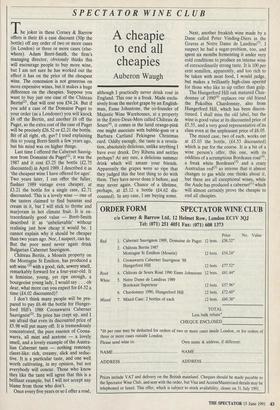SPECTATOR WINE CLUB
A cheapie to end all cheapies
Auberon Waugh
The joker in these Corney & Barrow offers is their £6 a case discount (50p the bottle) off any order of two or more cases (in London) or three or more cases (else- where). Adam Brett-Smith, the firm's managing director, obviously thinks this will encourage people to buy more wine, but I am not sure he has worked out the effect it has on the price of the cheapest wine. The concession is not generous on more expensive wines, but it makes a huge difference on the cheapies. Suppose you want to buy just one case of the Chateau Bertin(2), that will cost you £54.24. But if you add a case of the Domaine Puget to your order (as a Londoner) you will knock £6 off the Bertin, and another £6 off the Puget, so the extra cost of the case of Puget will be precisely £26.52 or £2.21 the bottle. Bit of all right, eh, guy? I tried explaining this to young Brett-Smith a few years ago, but his mind was on higher things.
Last time I offered the Cabernet Sauvig- non from Domaine du Puget(1), it was the 1987 and it cost £3.25 the bottle (£2.75 discounted) in April 1989. I described it as 'the cheapest wine I have offered for ages'. Two years later, I can offer the fuller, flashier 1989 vintage even cheaper, at £3.21 the bottle for a single case, £2.71 discounted. This is a lovely wine — one of the tasters claimed to find bananas and cream in it, but I will stick to thyme and marjoram in hot climate fruit. It is ex- traordinarily good value — Brett-Smith described it as 'unbelievable' without realising just how cheap it would be. I cannot explain why it should be cheaper than two years ago. Nor, I suspect, can he. But the poor need never again drink Bulgarian Cabernet Sauvignon.
Chateau Bertin, a Moueix property on the Montagne St Emilion, has produced a soft wine (2) with a good, rich, sewery smell, remarkably forward for a four-year-old. It is feminine, young, yet ripe enough, a bourgeoise young lady, I would say. . . oh dear, what more can you expect for £4.52 a time (£4.02 discounted)?
I don't think many people will be pre- pared to pay £6.46 the bottle for Hunger- ford Hill's 1988 Coonawarra Cabernet Sauvignon(3). Its price has crept up, and I am afraid that even its discounted price of £5.98 will put many off. It is tremendously concentrated, the pure essence of Coona- warra, all mint and acetone — a lovely smell, and a lovely example of the Austra- lian Cabernet taste — nothing remotely claret-like: rich, creamy, slick and seduc- tive. It is a particular taste, and one well worth cultivating, in my opinion, but not everybody will concur. Those who know they like the taste will agree that this is a brilliant example, but I will not accept any blame from those who don't.
Once every five years or so I offer a rosé, although I practically never drink rose in England. This one is a freak. Made exclu- sively from the merlot grape by an English- man, Esme Johnstone, the co-founder of Majestic Wine Warehouses, at a property in the Entre-Deux-Mers called Chateau de Sours(4), it comes in the lurid orange-pink one might associate with bubble-gum or a Barbara Cartland Pekingese Christmas card. Oddly enough, the taste is a revela- tion, absolutely delicious, unlike anything I have ever drunk. Dry Ribena and nettles perhaps? At any rate, a delicious summer drink which will amaze your friends. Apparently the grapes were so ripe that they judged this the best thing to do with them. They have never done it before, and may never again. Chance of a lifetime, perhaps, at £5.12 a bottle (£4.62 dis- counted). In any case, I am buying some. Next, another freakish wine made by a Dane called Peter Vinding-Diers in the Graves at Notre Dame de Landiras(5). I suspect he had a sugar-problem, too, and spent six months fermenting it under very cold conditions to produce an intense wine of extraordinarily strong taste. It is 100 per cent semillon, apparently, and too rich to be taken with most food, I would judge, but makes a brilliantly high-class aperitif for those who like to sip rather than gulp.
The Hungerford Hill oak matured Char- donnay of 1990(6) replaces our old friend the Pokolbin Chardonnay, also from Hungerford Hill, which has been discon- tinued. I shall miss the old label, but the wine is good value at its discounted price of £5.55, and a very good representative of its class even at the unpleasant price of £6.05.
The mixed case, two of each, works out at £5.03 the bottle, (£4.53 discounted) which is par for the course. It is a bit of a wine person's offer, this one, with its oddities of a scrumptious Bordeaux rose(4), a freak white Bordeaux(5) and a crazy Australian red(3) so intense that it almost changes to gas while one thinks about it, but these are all exceptional wines, while the Aude has produced a cabernet()) which will almost certainly prove the cheapie to end all cheapies.


















































 Previous page
Previous page